What Should you Ask?
This interview script generator will get you started, including…
- A well-tested 5-question interview script, customized for your interviews.
- Hints about what to listen for during your interviews.
- 6 bonus questions you can ask to fill in any blanks.
Here’s an example:
Use this template…
- As a starting point. Add & edit questions as necessary.
- As a place to store the notes from your interviews.
- To share with your teammates so you’re all asking the same questions.
Let’s Create your Script
Fill out each of the fields below then click Generate Script.
How to Use this Script
For more information on conducting interviews, check out my blog post, which also includes the video lesson below.
Blog Post: How to use the 5 Question Interview Script.

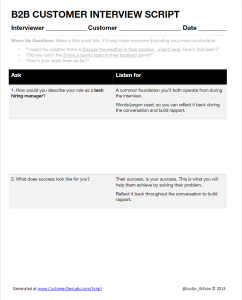
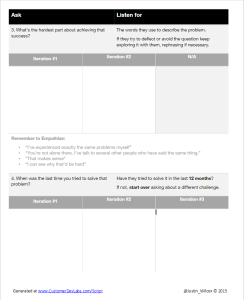
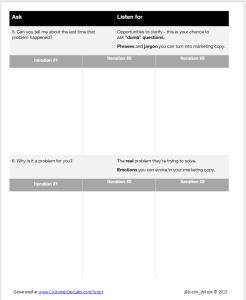


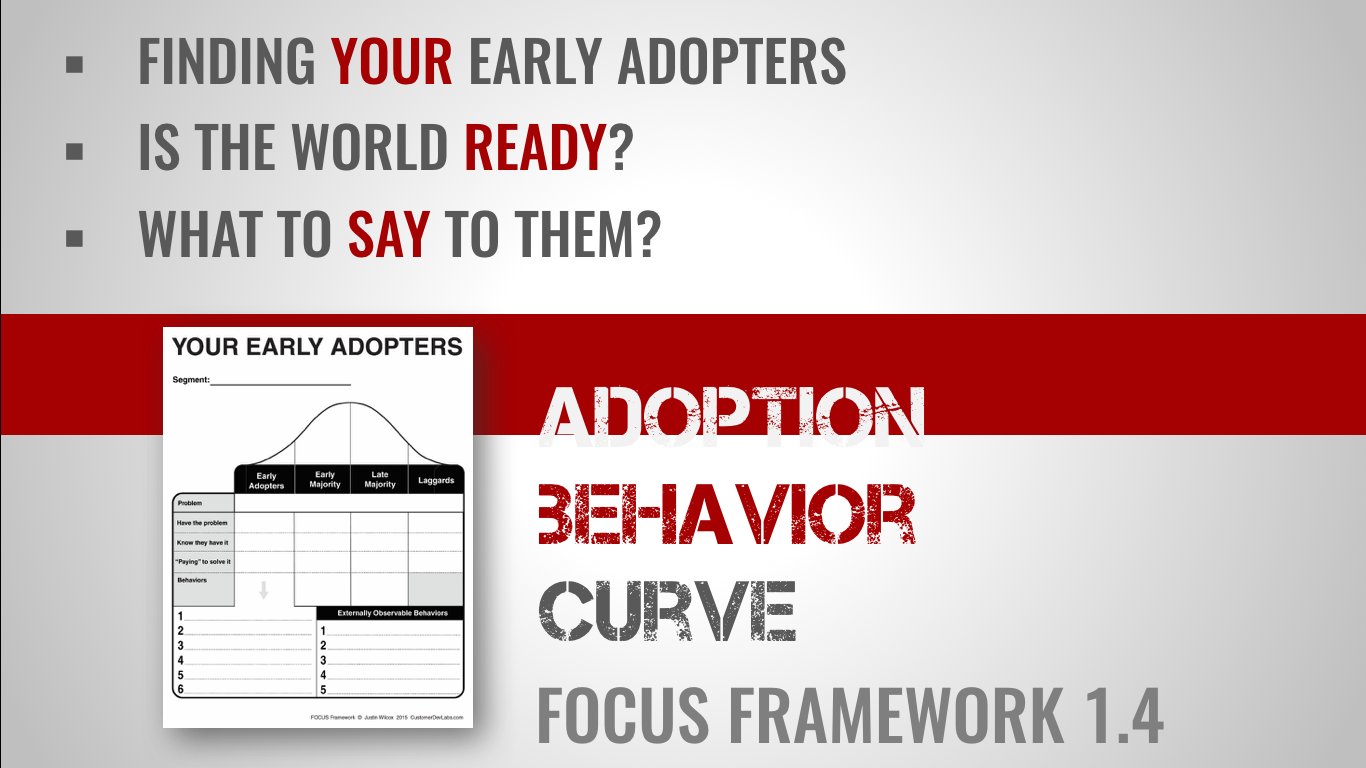
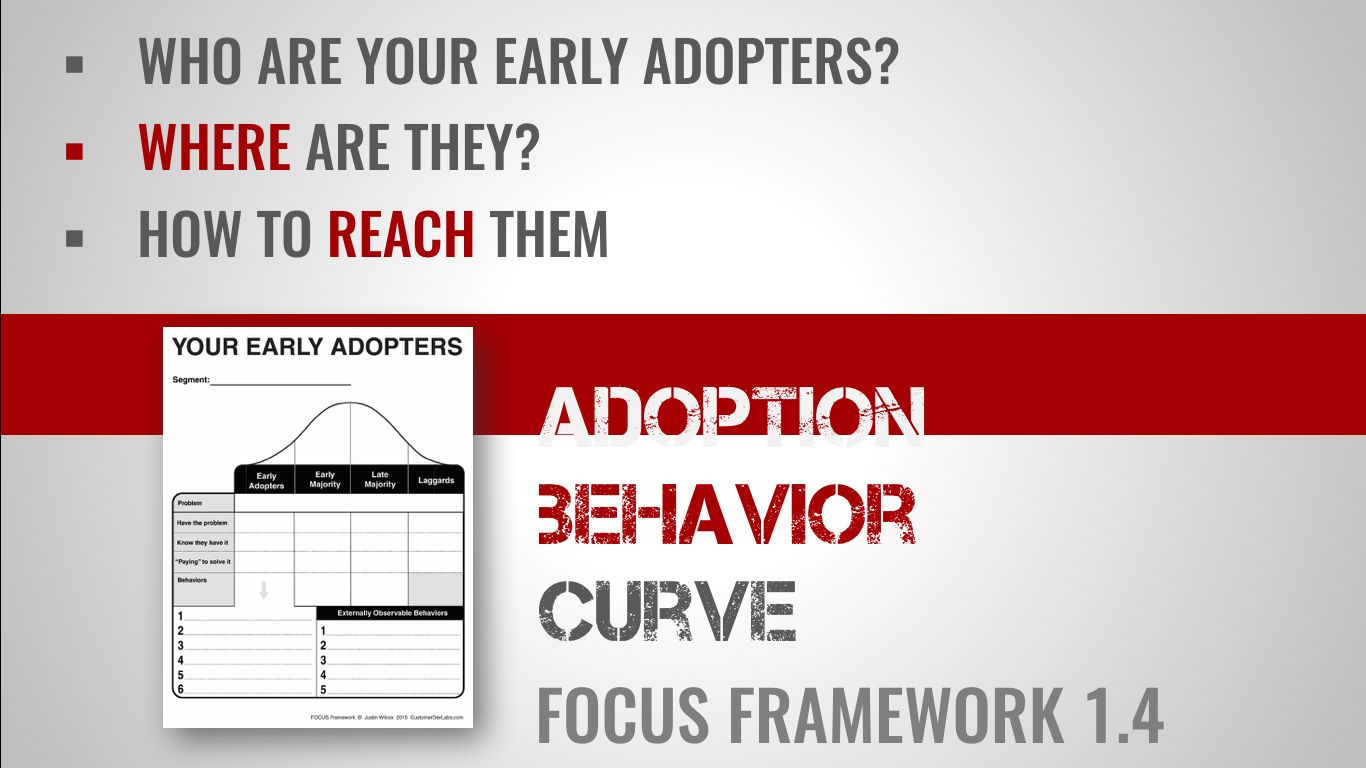
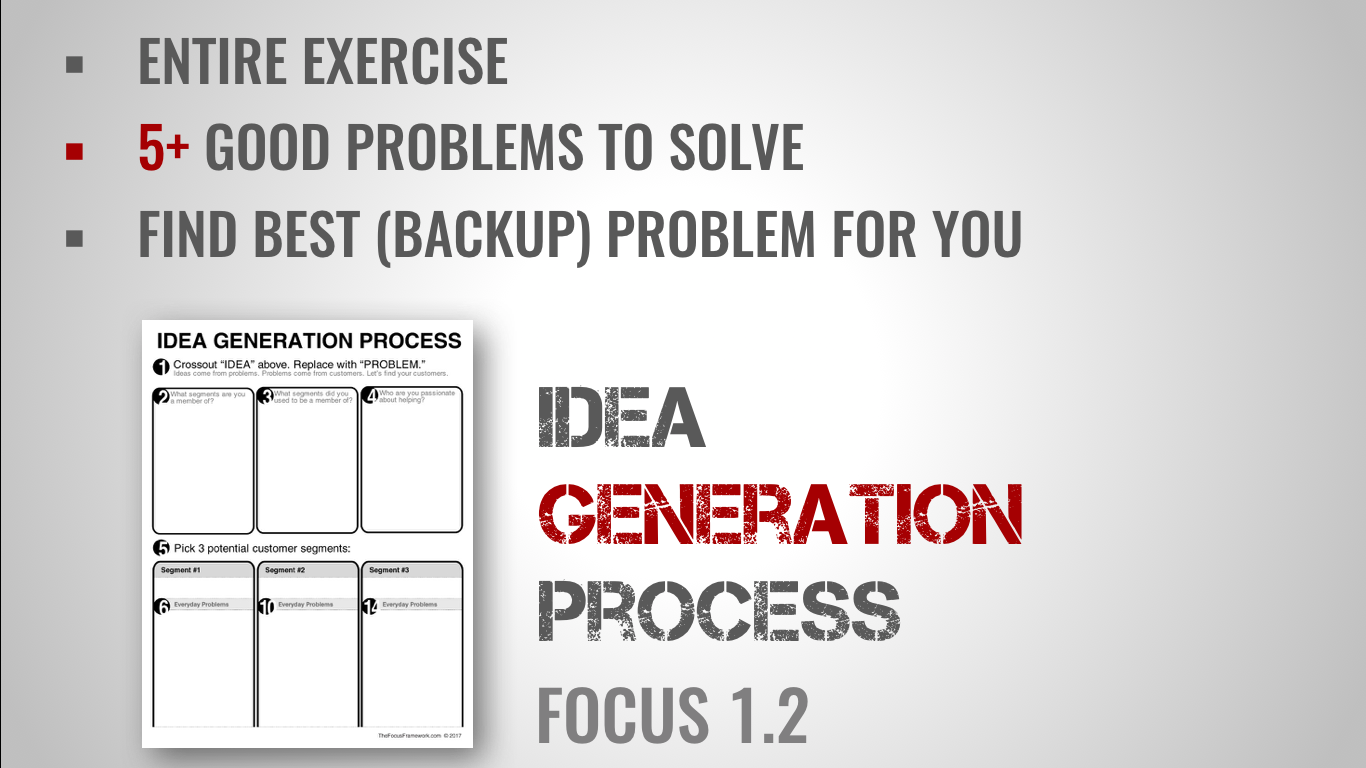




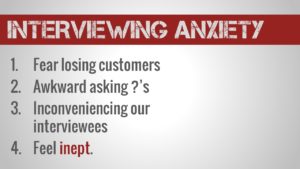
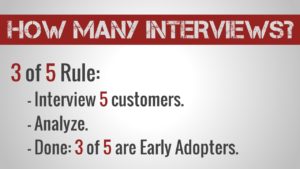

Hi Justin, for the B2B Interview Script. what may be some of the gotchas with changing #4. What to watch for
Your script suggests:
4. When was the last time you tried to solve that problem?
With the follow up of:
Have they tried a solution in last 12 months? If not, start over asking about a different challenge?
My question for you is: If this wasn’t a recent problem, Would it make sense at this point to ask, was there a recent hard problem that kept them from having a good day? (having success?). A problem that required some effort to resolve?, Then, start over again, iterating through about that recently encountered problem?
Thank you for publishing one of the best websites I’ve found on this topic!
Thanks for the kind words John.
I like the first question you suggest here because it gets the conversation focused on a problem that they may be eager to solve. Note: we’re not looking for problems that they’ve already solved, what we really want are the problems that have yet to be resolved.
I think you understand that distinction, I just wanted to emphasize that you’re on the right track, just be sure you’re searching for the problems they are experiencing now, that have yet to be resolved.
Justin
Hi Justin,
Please, tell me a story about a challenge you had trying to find a meeting space for a recent workshop?
What’s the hardest thing about finding locations for offering your workshops?
Why was that hard?
Absolutely want to honor your efforts and buy your framework !!!
Please reply with a link to your workshop calendar, any upcoming in summer/fall 2018?
Do you do one-on-one coaching?
Or do you have on-line workshops via skype or similar?
thank you.
Hey John, I love your intention here! Unfortunately you’re “leading the witness” and trying to point me to a specific problem you want to solve for me. I’m sorry to report, I don’t have any problems finding meeting spaces for workshops.
Instead of asking about my problems locating spaces for workshops, you want to ask me about my challenges as someone who runs workshops – your hypothesis being that my problems are finding locations to run them. If you approach the interview this way, you’ll know that if I say location sourcing is a problem, you’ll have truly validated the problem exists (as opposed to spoon-feeding me a problem), but better yet, if I don’t validate your hypothesis, you’ll immediately know what problem I do have, so you’ll have validated a different problem. Either way you win with this style of question.
Btw, my biggest workshop related problem is finding people who are willing to pay for digital conferences/workshops. I’d love to run more conferences like this http://teachinge.splashthat.com, but I’m not sure there’s enough demand to make it worthwhile.
I’ll send you an email wrt coaching.
Thanks for the questions John!
Justin
What do I do if I only have three users to interview? All the other are too far (need to be done over phone or Skype).
Skype is great for interviews! In fact, I do most of my interviews via Skype.
Ha! Is it really? Thanks for answering man. I thought I’d lose a whole dimension on not interviewing face to face (like body language, subtle facial expressions, emotions bla bla bla). But then again, I either cross the country (in Brazil) or Skype through. Any tips or mistakes to avoid when Skype-interviewing?
Very nice and easy to use guide! Are there any plans to do customerdevlabs in German? Did you ever get requests for this?
Thanks for the question. Every once in a while I get a request for translating my content, but it’s probably only once every couple months – not enough to make it worth the effort at this point.
Justin
Hi Justin,
The hypothesised problem is “providing alternative design furniture at a resonable price”. First it was and it still is a bit hard to fit the segment into a role – I don´t think they´ll call themselves furniture buyers.
Is it ok/does it give an useful anwer the question “What is the hardest part about buying furniture?” (I found it easier using the “BUYING or DOING” instead of “BEING”.
Hi Alexandre, makes sense that would be a little awkward.
I’m okay with you trying a “doing” as opposed to “being” language, but be aware as soon as you make that switch, you’re pointing your interviewee toward a set of problems that they may not be actively trying to solve. If you go this route, be sure to ask when the last time they tried to _solve_ any problem they mention. If it wasn’t w/n the last 6 months, be wary, they probably aren’t an early adopter for that problem (and thus you’ll want to avoid solving it for them).
Justin
Hi Justin… First of all I would like to commend you on this awesome video and also the fact that you take time to reply the comments. However, I am having a real big challenge preparing the questions. What I am trying to do is to develop partnerships between my organisation and another company and most of the time , the companies just ignore the proposals I drop in their office. So this time I really want to give them an offer they can’t say no to and I think the best way is knowing what they want. I would really love if you respond. Thanks
Isabel
Thanks for the question Isabel. Something tells me the companies don’t respond because these proposals aren’t solving a problem a person within the company is actively trying to solve.
First thing I would recommend is shift your thinking away from partnerships between your “organization and another company” because ultimately, B2B partnerships are made between your org and a “person” at another company. Start thinking about the role of the person who is currently looking to solve the problem you want to help them solve. Find the person who is trying to solve a problem, and you’ll find the person who will talk with you/read your proposal.
If you haven’t already checked it out, the FOCUS Framework will be your friend here. In particular, the Customer Storming & Role-izing and the Adoption Behavior Curve will shine some light on your next steps.
Best of luck!
Justin
Hi, Justin. Thank you very much for this tool. It is very well done and very helpful. I am trying to use it to understand my customer but I have a couple of doubts on how to manage the following situation:
I am starting with very broad questions like “What’s the biggest challenge you are facing as a coach?”. People answer with issues that are not related at all with my solution.
Should I keep asking the next questions on the script (“When was the last time you tried to solve that problem?”) to explore it deeper or should I move to iteration #2 so that I can narrow on the problem context I am trying to understand?
I understand that if the problem I have hypothesized is not top of mind maybe I don’t have a problem important enough for customers to care. But sometimes people need more context to put things in perspective.
For instance for the first question above, I usually get “I need more clients”. That’s obviously more important than the context I am trying to explore. Detailing that feels like a waste of time.
Regards
Great question Caique – thanks for asking it. I know you’re not the only person that runs into this problem.
The answer to your question can be found in the answer to another question:
– “What’s more important to you: solving the problem the coaches you’re talking to are trying to solve, or solving the problem you want to solve?”
In other words, are you more committed to serving coaches, or solving the problem you think coaches have? Either answer is fine, but the answer is important.
If it’s more important that you solve the problem you want to solve, then you can actually skip to iteration #3 (the one where you ask them about the specific problem context you envision they are likely to encounter the problem you want to solve).
If when you jump to iteration #3 and you find they still aren’t taking action to solve the problem you want to help them with, then you need to change who you’re talking to so that the first challenge the mention is the one you want to solve. If after multiple attempts you determine those people simply don’t exist, you are officially ahead of your time – and you best bet will be to pivot to another segment entirely, or solve the most interesting problem you heard during your interviews.
If on the other hand serving coaches and solving their real problems is more interesting to you than solving a specific problem, then, do the entire interview script.
The nice thing about the latter option is that you know there are Early Adopters for the problem, and clearly you know how to find them – the only question is are you passionate about solving their problems?
Fwiw, I highly recommend you do the “Declaring Victory” Exercise from FOCUS – you can do a digital version for free here: http://TheFocusFramework.com. It will help you understand why you’re *really* starting a company, and in doing so will help answer the question above.
If you decide to pick up a copy of FOCUS, I recommend you jump right into exercise #4 of the first workbook – it’s called where are your Early Adopters. It’s going to help you figure out where/how to find coaches that are most likely going to cite the problem you want to solve as their biggest challenge (assuming those people actually exist).
Either way, wishing you all the best and keep us posted on your progress!
All the best,
Justin
Very cool ..Thank you for a wonderful tool
Thank you so much for such an helpful article. Brilliant
Checking this out. Pretty nice.
But I don’t fully understand how you are expecting us to use the “Interation #n” under each question, though?
Good question Mike.
The idea is to loop the script multiple times with each customer, ideally illiciting 3 of the problems they’re currently trying to solve. Each “column” in the script equals an interaction so you’d start with the first column and then once you’ve finished it, you’d start again in the 2nd column. Once you finish the 2nd column, you move on to the 3rd.
Not every question is meant to be repeated, so not every question has multiple columns.
Let me know if that helps or not. If not, I’ll try to clarify further.
Thanks again for the question,
Justin
This small details is sooo HUGE! thanks for adding that